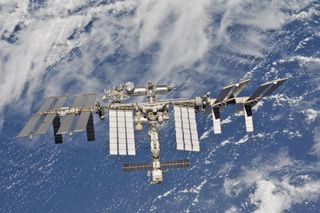published about 13 hours ago
A cargo ship attached to the station performed a five-minute engine burn on Monday night (Oct. 24) to get the ISS out of harm's way.

RELATED STORIES:
— The worst space debris events of all time
— Kessler Syndrome and the space debris problem
— The most dangerous space weapons ever
This is not the first time the International Space Station has had to avoid debris left over from the Russian ASAT test. In June 2022, the space station made a similar maneuver to avoid a fragment of Cosmos 1408.
In the wake of the Russian ASAT test conducted on Cosmos 1408, several nations have made commitments not to perform destructive ASAT tests to help prevent the proliferation of space debris in orbit. These include the Republic of Korea, Germany, Japan, Canada, New Zealand, the United States and the United Kingdom.
A cargo ship attached to the station performed a five-minute engine burn on Monday night (Oct. 24) to get the ISS out of harm's way.

The International Space Station took evasive action to avoid a piece of space junk on Oct. 24, 2022. (Image credit: NASA)
The International Space Station (ISS) just took evasive action to dodge a fragment of a satellite destroyed in a November 2021 Russian anti-satellite test.
On Monday (Oct. 24) at 8:25 p.m. EDT (0025 GMT on Oct. 25), the ISS team fired the thrusters on Progress 81, a Russian cargo ship attached to the station, for a total of five minutes and five seconds to avoid the debris fragment, according to a NASA statement(opens in new tab).
This "Pre-Determined Debris Avoidance Maneuver" (PDAM) was performed in order to "provide the complex an extra measure of distance away from the predicted track" of the debris fragment, agency officials said.
The maneuver raised the ISS's altitude by 0.2 miles (0.32 kilometers) at apogee (its farthest point from Earth) and 0.8 miles (1.3 km) at perigee (its closest point to Earth), according to NASA. The thruster firing did not affect normal space station operations.
Related: Russian anti-satellite missile test draws condemnation from space companies and countries
The debris fragment that prompted the avoidance maneuver was created by a Russian test of a direct ascent anti-satellite (ASAT) missile conducted on Nov. 15, 2021. The missile, launched from the ground, destroyed a defunct Soviet satellite known as Cosmos 1408 that had been out of commission since the 1980s.
"There's really no reason they should have used such a big target," astrophysicist and satellite tracker Jonathan McDowell, of the Harvard-Smithsonian Center for Astrophysics in Cambridge, Massachusetts, told Space.com at the time. "They could have used a smaller target and generated less debris."
The test has since drawn widespread condemnation from space agencies and space policy experts worldwide and prompted astronauts aboard the ISS to take shelter.
The International Space Station (ISS) just took evasive action to dodge a fragment of a satellite destroyed in a November 2021 Russian anti-satellite test.
On Monday (Oct. 24) at 8:25 p.m. EDT (0025 GMT on Oct. 25), the ISS team fired the thrusters on Progress 81, a Russian cargo ship attached to the station, for a total of five minutes and five seconds to avoid the debris fragment, according to a NASA statement(opens in new tab).
This "Pre-Determined Debris Avoidance Maneuver" (PDAM) was performed in order to "provide the complex an extra measure of distance away from the predicted track" of the debris fragment, agency officials said.
The maneuver raised the ISS's altitude by 0.2 miles (0.32 kilometers) at apogee (its farthest point from Earth) and 0.8 miles (1.3 km) at perigee (its closest point to Earth), according to NASA. The thruster firing did not affect normal space station operations.
Related: Russian anti-satellite missile test draws condemnation from space companies and countries
The debris fragment that prompted the avoidance maneuver was created by a Russian test of a direct ascent anti-satellite (ASAT) missile conducted on Nov. 15, 2021. The missile, launched from the ground, destroyed a defunct Soviet satellite known as Cosmos 1408 that had been out of commission since the 1980s.
"There's really no reason they should have used such a big target," astrophysicist and satellite tracker Jonathan McDowell, of the Harvard-Smithsonian Center for Astrophysics in Cambridge, Massachusetts, told Space.com at the time. "They could have used a smaller target and generated less debris."
The test has since drawn widespread condemnation from space agencies and space policy experts worldwide and prompted astronauts aboard the ISS to take shelter.
RELATED STORIES:
— The worst space debris events of all time
— Kessler Syndrome and the space debris problem
— The most dangerous space weapons ever
This is not the first time the International Space Station has had to avoid debris left over from the Russian ASAT test. In June 2022, the space station made a similar maneuver to avoid a fragment of Cosmos 1408.
In the wake of the Russian ASAT test conducted on Cosmos 1408, several nations have made commitments not to perform destructive ASAT tests to help prevent the proliferation of space debris in orbit. These include the Republic of Korea, Germany, Japan, Canada, New Zealand, the United States and the United Kingdom.

No comments:
Post a Comment